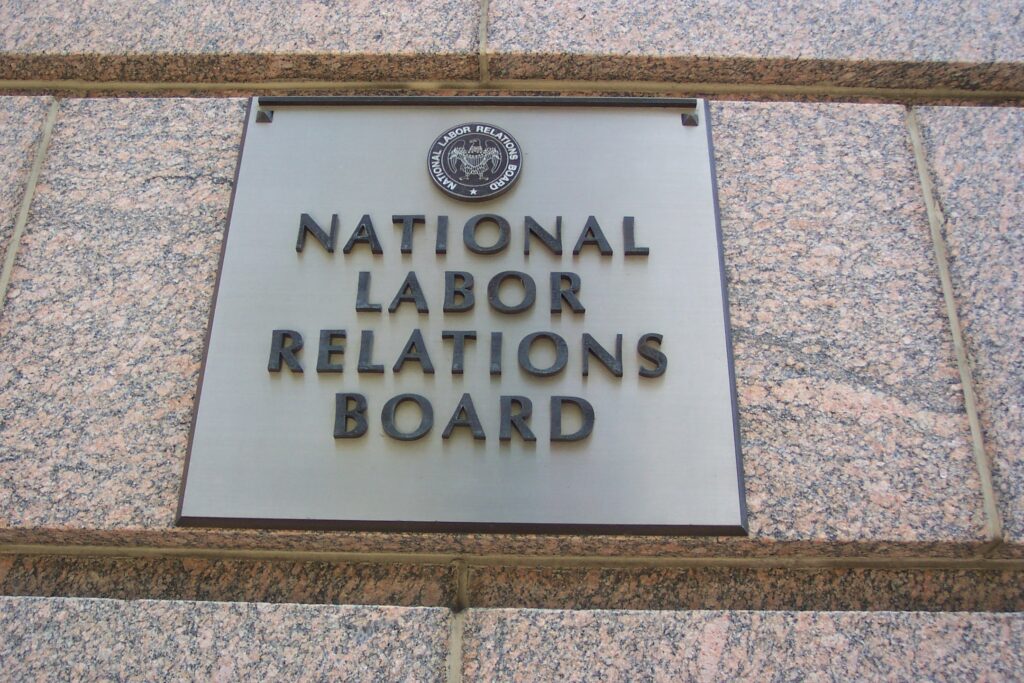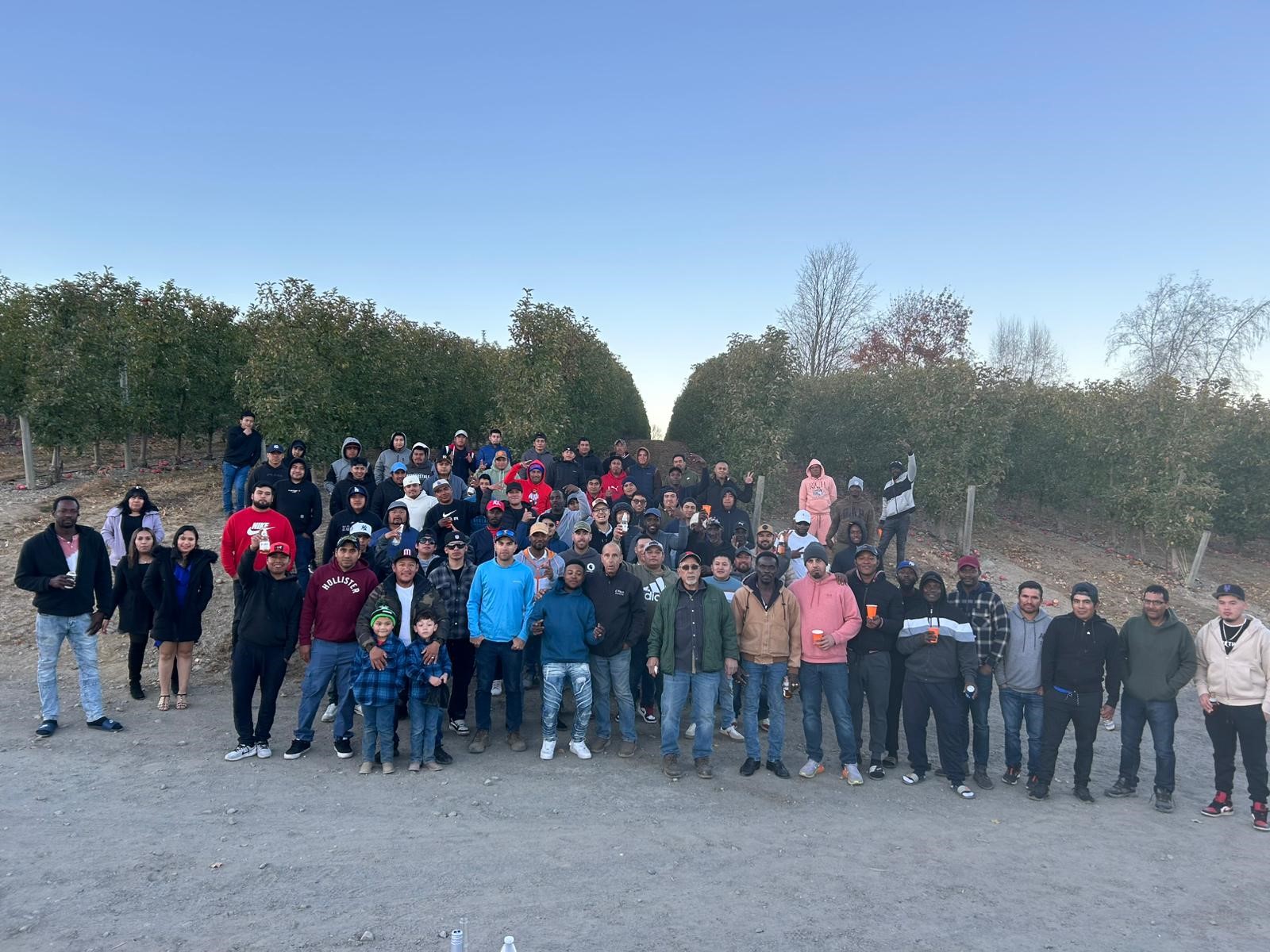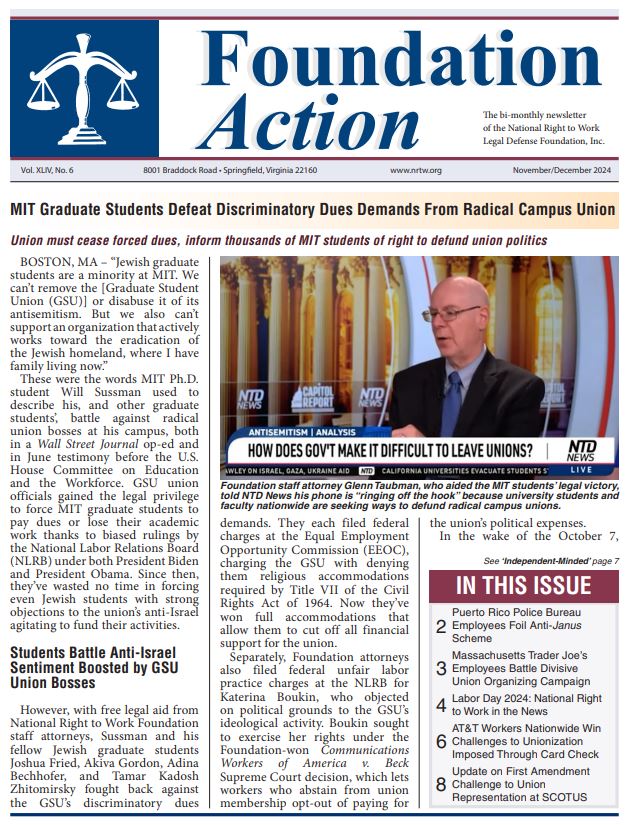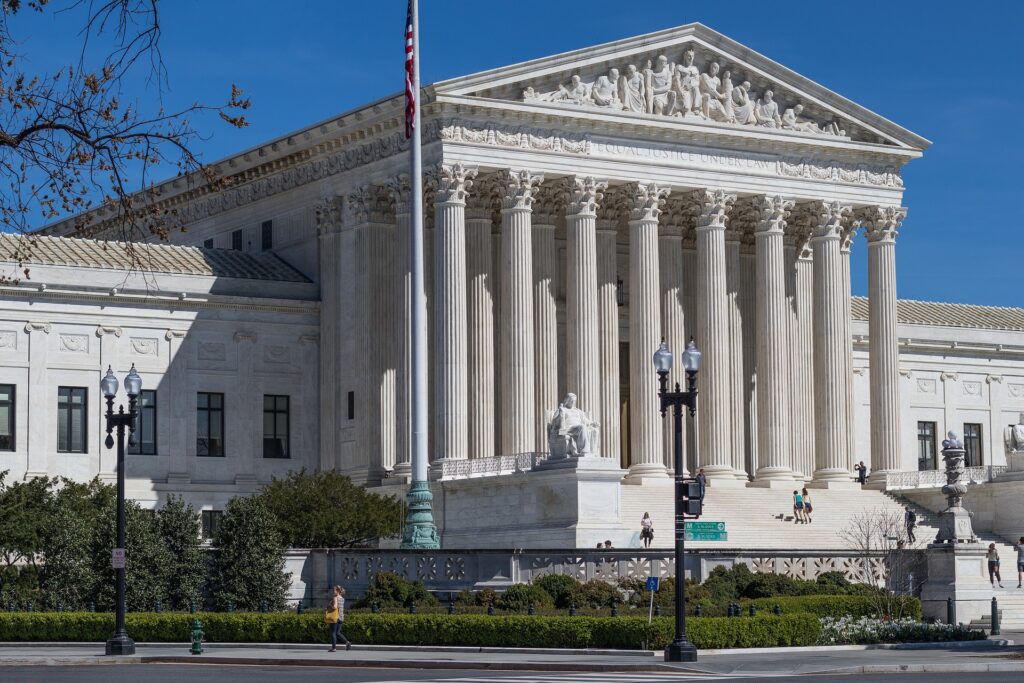Austin Worker Files 5th Foundation-Backed Lawsuit Arguing NLRB Violates US Constitution
The following article is from the National Right to Work Legal Defense Foundation’s bi-monthly Foundation Action Newsletter, January/February 2025 edition. To view other editions of Foundation Action or to sign up for a free subscription, click here.
Case joins others for employees nationwide arguing Labor Board’s structure is illegal
Dallas Mudd helps connect people with the social services they need, and his and many other workers’ ability to do their important work shouldn’t be stymied because unaccountable NLRB bureaucrats are forcing union “representation” on them.
AUSTIN, TX – In November, Dallas Mudd, an employee for online social service coordination platform Findhelp, filed a federal lawsuit against the National Labor Relations Board (NLRB) on the grounds that the agency’s structure is unconstitutional. Mudd’s case, filed in the U.S. District Court for the Northern District of Texas, is the latest in a series of legal actions by National Right to Work Foundation staff attorneys for employees challenging the NLRB’s authority.
Mudd’s case comes after he filed a decertification petition with the NLRB, seeking a vote to remove the Office & Professional Employees International Union (OPEIU) from his workplace. However, NLRB officials blocked the vote, disenfranchising Mudd and his colleagues on the basis of unproven charges union bosses made against Findhelp. Mudd appealed the decision to the full NLRB in Washington, D.C., while also filing a federal lawsuit to challenge NLRB members’ removal protections.
Shortly after the lawsuit was filed, Mudd’s Foundation attorney also asked the Northern District Court of Texas to issue a preliminary injunction stopping the NLRB from adjudicating his appeal until the issue of the NLRB’s constitutionality is resolved. Mudd argues that he is suffering ongoing and irreparable harm by being forced to navigate a statutory process before an agency that he claims is unconstitutionally structured.
Constitutional Challenge: A Broader Legal Campaign
Meanwhile, in its own case against the NLRB, Findhelp has successfully secured an injunction against the NLRB in a federal district court making arguments similar to those raised by Mudd.
Mudd’s lawsuit follows four other constitutional challenges backed by the National Right to Work Foundation, targeting the NLRB’s structure. This includes a case for New York Starbucks employees Ariana Cortes and Logan Karam, who filed the first constitutional challenge to NLRB Board Member protections.
Their case is currently being briefed at the D.C. Circuit Court of Appeals, but since their groundbreaking lawsuit, numerous major employers have utilized the arguments first made in federal court by Foundation staff attorneys to challenge the radically pro-union boss BidenHarris NLRB.
“Independent-minded workers should not be forced to depend on biased agencies staffed by bureaucrats who exercise power in violation of the Constitution,” said National Right to Work Foundation Vice President Patrick Semmens.
“The Constitution does not permit a powerful federal agency to operate as the judge, jury, and executioner without proper oversight.
“Contrary to the wishes of Big Labor bosses, federal labor law is not exempt from the requirements of the U.S. Constitution,” added Semmens.
Michigan Security Guards Overwhelmingly Vote to End Union Bosses’ Forced-Dues Power
The following article is from the National Right to Work Legal Defense Foundation’s bi-monthly Foundation Action Newsletter, January/February 2025 edition. To view other editions of Foundation Action or to sign up for a free subscription, click here.
After Big Labor-backed Right to Work repeal, Michigan workers including security guards continue fighting forced dues
James Reamsma and his fellow security guards finally secured their right to stop their hard-earned money from going to UGSOA union bosses after a months-long legal battle. Such anti-forced-dues cases continue to increase in Michigan.
GRAND RAPIDS, MI – Ever since Michigan legislators repealed the state’s popular Right to Work law, Michigan employees have been turning to the National Right to Work Legal Defense Foundation to help them fight to protect themselves from union bosses’ forced-dues demands. In a long-running case, security guard James Reamsma and his colleagues at Triple Canopy Inc. not only ended union officials’ power to require union dues payments as a condition of employment, but also freed themselves of unwanted union ‘representation.’
With Foundation legal aid, the security guards organized a National Labor Relations Board (NLRB) “deauthorization election” to strip United Government Security Officers of America (UGSOA) Local 288 union officials of their power to compel union financial support.
Overwhelming Vote Against Forced Dues Triggers End of Unwanted ‘Representation’
Despite an overwhelming vote by participating workers against forced union dues, union lawyers’ delay tactics stalled final certification of the results until October. At that point, the dissenting security guards were officially free to cut off all union dues payments, as had been the case when Michigan’s Right to Work law was in place and all union financial support was strictly voluntary.
At that point, faced with the prospect that the vast majority of the guards would likely stop dues payments, UGSOA bosses announced they were ending their so-called “representation” at Triple Canopy. This means the security guards are now not only free of forced dues, but also of monopoly union representation they oppose.
“UGSOA union officials have threatened to have everyone who does not join the union fired,” Reamsma said soon after his case was filed. “Many of us are retired police officers, or military, working part time, supplementing our income by providing security for government buildings across Michigan. When Right to Work was in place, guards were never forced to join the union.”
In addition to the deauthorization petition, Reamsma filed unfair labor practice charges against UGSOA, citing illegal union dues demands. The charges note that union officials were violating his rights under the Foundation-won CWA v. Beck Supreme Court decision by denying Reamsma a required breakdown of how the forced-dues amount was calculated, and also by attempting to require that he let the union automatically deduct dues out of his paycheck. Those charges remain pending with the NLRB.
Despite a vast majority of Michiganders — including those in union households — expressing support for Right to Work, union boss partisans re-granted forced-dues powers to Michigan union officials in 2023.
Foundation attorneys filed more than twice the number of cases for Michigan workers in 2024 (the year the repeal went into effect) than through all of 2023. That increase includes a number of deauthorization cases. In states that lack Right to Work protections, like Michigan does currently, the only way that workers can end union bosses’ pay-up-or-be-fired dues demands is by voting as a majority against forced dues in a “deauthorization election” or by voting to remove the union completely.
Often workers may prefer to end union “representation” entirely, but union-backed NLRB rules severely limit when decertification votes can be held, including for up to three years when a forced-dues union contract is in place. As a result, workers often turn to deauthorization to cut off union dues payments in order to incentivize union bosses to leave completely, as happened with James Reamsma and his coworkers.
Fight Against Forced Dues in Michigan Continues
“Mr. Reamsma’s situation shows the kind of greedy gamesmanship union officials can engage in without Right to Work,” commented National Right to Work Foundation President Mark Mix.
“As soon as Reamsma and his coworkers had gone through the complex process of voting to strip them of their forced-dues power, union officials immediately fled the workplace — almost as if they were only there to collect dues from workers who had no choice but to pay up to avoid termination.
“While we are proud to assist Michigan workers in navigating these challenges, cases like these show why it was such a mistake to repeal Michigan’s popular Right to Work law to begin with,” added Mix.
New York Farmworkers Seek to Challenge ‘Card Check’ & Uproot UFW Union Bosses
The following article is from the National Right to Work Legal Defense Foundation’s bi-monthly Foundation Action Newsletter, January/February 2025 edition. To view other editions of Foundation Action or to sign up for a free subscription, click here.
Farmworkers fight union argument that New York labor law lets union bosses trap workers forever
Porpiglia Farms workers, who were targeted by an aggressive UFW ‘card check’ campaign against the farmworkers, are banding together to vote the union out and ensure that union officials reap what they have sown.
MARLBORO, NY – In 2020, the New York State Assembly passed a Big Labor-backed law that granted union officials sweeping new powers to impose their monopoly bargaining control over the state’s farmworkers. Since New York is one of 24 states that lacks a Right to Work law, the law authorizes union bosses to force farmworkers to pay union dues or else be fired.
But that’s not all: New York labor law went even further by mandating “card check” organizing, in which union officials deny workers a secret ballot union vote and instead claim majority support by submitting cards ostensibly showing worker support. These cards are often collected through pressure tactics, intimidation, or even threats.
But even that dramatic increase in power over the agricultural sector and agricultural workers is not enough for United Farm Workers (UFW) union officials.
UFW tyrants are advancing the cynical argument that, under New York law, workers can be forced into union ranks but can never escape forced unionism. They argue this to counter a recent National Right to Work Foundation-backed union decertification case for employees of Porpiglia Farms, an apple farm in the Hudson Valley of New York.
NY Fruit Farmworkers Seek Union Ouster After ‘Card Check’
Porpiglia employee Ricardo Bell submitted a petition last year in which he and his coworkers asked the New York Public Employment Relations Board (PERB) to hold a vote at the orchard on whether to remove the UFW. (Despite its name, PERB is responsible for enforcing labor law in both New York’s public and agricultural sectors.)
In late 2024, Foundation attorneys filed a brief for Bell countering union officials’ absurd argument that one card check drive should lock employees in a union forever. Additionally, more Foundation-backed decertification cases are sprouting up in both New York and other Big Labor-dominated states for farmworkers who are rejecting UFW officials’ card check schemes.
Brief Challenges Theory That Workers Have No Right to Remove Incumbent Union
Bell filed his decertification petition with Foundation legal aid after UFW union officials seized power at his workplace through a hasty card check unionization drive. His newest filing attacks union bosses’ contention that once a union is certified as the monopoly union “representative” of a work unit, there can be no option to remove it.
“[New York labor law] does not indicate that employees have a single chance at self-organization,” the brief says. “If that were the case, the very action of choosing a representative under [New York labor law] would deprive employees of the ability to exercise [their rights] in perpetuity….”
Foundation-Backed Workers Battle UFW ‘Card Checks’ Across Country
Since Bell’s filing, Foundation attorneys have also assisted in a union decertification effort for workers at Cherry Lawn Fruit Farms near Rochester, NY, who were targeted by a similar UFW card check campaign. These two groups of New York farmworkers join Foundation-backed employees of Wonderful Nurseries in California in challenging the UFW’s tactics.
Wonderful Nurseries workers still have multiple unfair labor practice charges pending against UFW bosses for deceptive behavior during an early 2024 card check drive. The charges detail UFW agents lying about the true purpose of cards that they collected from workers, and harassing workers who now back an effort to vote the union out.
“The aggressive and often demeaning tactics that UFW union officials use to seize control over agricultural workers show clearly why ‘card check’ is a bad idea in the agricultural sector, the public sector, and in any sector,” commented National Right to Work Foundation Vice President and Legal Director William Messenger. “UFW officials are arguing that workers should have little or no chance at all to challenge a union’s ascent to power by this process.
“The idea that workers have no ability to eject a union once it is installed in power further demonstrates that this is not about workers’ choices at all, only about union bosses’ power over workers, even when workers overwhelmingly want nothing to do with union bosses’ so-called ‘representation,’” added Messenger.
Chicago 911 Operators Notch Another Janus Victory Over IBEW
The following article is from the National Right to Work Legal Defense Foundation’s bi-monthly Foundation Action Newsletter, January/February 2025 edition. To view other editions of Foundation Action or to sign up for a free subscription, click here.
Foundation attorneys stopped deceptive cycle that kept illegal dues flowing for months
Patricia Whittaker heard ridiculous excuses from IBEW union officials about how they couldn’t honor her Janus rights. But after teaming up with Foundation attorneys, she’s cut off dues to IBEW bosses.
CHICAGO, IL – Another 911 operator employed by the City of Chicago has successfully defended her First Amendment rights under the National Right to Work Foundation-won Janus v. AFSCME Supreme Court decision. Late last year, Operator Patricia Whittaker sought free Foundation legal aid after facing months of stonewalling from International Brotherhood of Electrical Workers (IBEW) Local 21 union officials, who refused to stop taking dues from her paycheck against her will.
Whittaker fought these dues seizures by invoking her First Amendment rights under Janus. Foundation attorneys argued and won the Janus case before the Supreme Court in 2018. The Supreme Court agreed with Foundation attorneys and ruled that union officials could not force public sector employees to pay union dues or fees as a condition of employment, and that union officials must obtain affirmative employee consent before deducting union dues from any public worker’s paycheck.
In October, following unfair labor practice filings by Foundation attorneys at the Illinois Public Employment Relations Board (PERB), IBEW union bosses abandoned their unconstitutional dues demands — and other outrageous behavior they had subjected Whittaker to.
IBEW Union Outrageously Claimed They Had No Power to Stop Dues Deductions
Whittaker faced much more than just illegal dues deductions during her ordeal. IBEW officials engaged in a deceptive cycle in which Whittaker was told to resolve the matter with her employer, while the employer directed her back to the union, resulting in continued dues deductions for over 10 months. In doing so, the charges maintained, union officials misrepresented the law by making it appear as if they were the “good guys” by remitting dues deducted by the City of Chicago through checks back to her and claimed that only the employer — not the union — had the power to end dues deductions.
This isn’t the first time IBEW 21 union officials have been caught imposing illegal dues practices on Chicago 911 employees. In June 2024, Rhonda Younkins also triumphed in her months-long legal battle to exercise her First Amendment right to stop all union dues payments to IBEW Local 21. IBEW Local 21 union officials stopped their violation of Younkins’ Janus rights only after Foundation attorneys filed charges at PERB on Younkins’ behalf.
Independent-Minded Workers Continue to Defend Freedom with Janus
The Janus decision’s impact continues to grow. Immediately following the ruling, nearly a half a million public employees stopped paying union dues, with many others following in subsequent years as litigation backed by Foundation attorneys continues to defend their rights.
“The behavior of IBEW Local 21 union officials highlight just how crucial it is for public employees to be aware of, and assert, their Janus rights,” said National Right to Work Foundation President Mark Mix.
“While we at the Foundation are proud to help more workers protect their hard-earned money from funding union bosses and union agendas they don’t support, it is unacceptable that it takes aggressive legal action just to force union officials to respect workers’ constitutional freedoms.”
Dartmouth, MIT, Vanderbilt Graduate Students Challenge Forced Unionism
The following article is from the National Right to Work Legal Defense Foundation’s bi-monthly Foundation Action Newsletter, January/February 2025 edition. To view other editions of Foundation Action or to sign up for a free subscription, click here.
Foundation-backed students defend rights as union bosses seek more power at universities
Ben Logsdon is a Ph.D. student in mathematics at Dartmouth College. But it doesn’t take a genius to realize that union officials’ refusals to accommodate his religious objections just don’t add up.
HANOVER, NH – Just weeks after National Right to Work Foundation staff attorneys triumphed in anti-discrimination cases for Jewish Massachusetts Institute of Technology (MIT) graduate students who sought to stop forced dues payments to a radically anti-Israel union, union officials began creating other problems for university students.
In nearby New Hampshire, Dartmouth graduate student Benjamin Logsdon sought free Foundation legal aid against Graduate Organized Laborers of Dartmouth (GOLD-UE) union officials. The GOLD union — which is an affiliate of the same United Electrical (UE) union involved in the Foundation’s MIT cases — is forcing Logsdon to accept the union’s monopoly “representation” powers against his will, even after he voiced his religious objections to the union’s radical stances on the conflict against Israel.
Grad Students Exposed to Union Coercion & Privacy Violations
Meanwhile, several graduate students at Vanderbilt University in Nashville, TN, are pushing back against an attempt by Vanderbilt Graduate Workers United (VGWU, an affiliate of United Auto Workers) union bosses to impose union control over them and their colleagues. Specifically, three students are seeking to intervene in a federal case in which VGWU union officials are illegally demanding the university hand over the students’ private information to aid in their unionization campaign. Foundation staff attorneys filed motions for intervention for these students in October 2024.
Foundation attorneys are arguing that union officials severely violate students’ rights in both of these cases. However, the reason that union officials are in power on college campuses at all traces back to flawed rulings from the National Labor Relations Board (NLRB) under both the Obama Administration and Biden Administration. These rulings subject graduate students to pro-Big Labor provisions of the National Labor Relations Act (NLRA), which create issues for students’ freedom both inside and outside the classroom.
Logsdon, a Christian Ph.D. student in mathematics at Dartmouth, slammed the GOLD union with federal anti-discrimination charges in September 2024 at the Equal Employment Opportunity Commission (EEOC). According to those charges, shortly after the GOLD union finalized its first monopoly bargaining contract with the Dartmouth administration, he sent a letter to United Electrical General Secretary-Treasurer Andrew Dinkelaker explaining that he objected to being affiliated with GOLD on religious grounds and needed an accommodation.
“I sought to be removed from the UE and GOLD-UE bargaining unit as a reasonable accommodation,” Logsdon’s Foundation-backed charges say.
Dinkelaker refused to offer Logsdon an accommodation that “satisf[ied] [his] religious conscience or beliefs,” according to the charges, which violated his rights under Title VII of the Civil Rights Act of 1964.
Courts have recognized a variety of Title VII religious accommodations over the years for men and women who have religious objections to union affiliation, including paying an amount equivalent to union dues to a charity instead of union bosses. However, Logsdon seeks a different accommodation: to remove himself from union bosses’ control entirely.
At Vanderbilt, three students who identify themselves in legal documents as “John Doe 1,” “John Doe 2,” and “Jane Doe 1” are contending in their Foundation-backed motions for intervention that the Family Educational Rights and Privacy Act (FERPA) forbids the Vanderbilt administration from disclosing their personal information to any third parties without their permission, including the VGWU union.
At the union’s behest, NLRB Region 10 has already hit the Vanderbilt administration with a pair of subpoenas demanding personal student info, while ignoring objections from several students expressing concern at the disclosure.
So far Vanderbilt has resisted the NLRB’s subpoenas, and fortunately a federal court has temporarily allowed the university to refuse to comply with them.
The Foundation-backed students’ motions to intervene argue that the subpoenas “are an attempt to violate FERPA’s protections, privileging union interests over the graduate students[’] privacy rights.” It also points out that FERPA allows students to seek “protective action” if a university receives a subpoena seeking their personal information, as in this case.
The Vanderbilt students and their Foundation attorneys are demanding an opportunity to properly defend their privacy interests under FERPA. Foundation attorneys have already filed Requests for Review asking the NLRB in Washington, DC, to weigh in on the matter.
Union Monopoly Power Has No Place at Universities
“Graduate students around the country are discovering that union bosses don’t respect their individual rights and would rather use students as pawns to force their demands on a university administration, or advance an extreme political agenda,” commented National Right to Work Foundation Vice President and Legal Director William Messenger.
“Union monopoly bargaining is a system particularly ill-suited to an academic environment. Indeed, it is wrong for anyone to have a union monopoly imposed on them against their will and then be forced to pay union dues under threat of termination.”
Full Foundation Action November/December 2024 Newsletter Now Online
All articles from the November/December 2024 issue of Foundation Action are now online.
In this issue:
- MIT Graduate Students Defeat Discriminatory Dues Demands From Radical Campus Union
- Puerto Rico Police Bureau Employees Foil Anti-Janus Scheme
- Massachusetts Trader Joe’s Employees Battle Divisive Union Organizing Campaign
- Labor Day 2024: National Right to Work in the News
- AT&T Workers Nationwide Win Challenges to Unionization Imposed Through Card Check
- Update on First Amendment Challenge to Union Representation at SCOTUS
Recent articles can be found here. To sign up for a free copy of the newsletter via mail please see the form at the bottom of this page.
AT&T Workers Nationwide Win Challenges to Unionization Imposed Through Card Check
The following article is from the National Right to Work Legal Defense Foundation’s bi-monthly Foundation Action Newsletter, November/December 2024 edition. To view other editions of Foundation Action or to sign up for a free subscription, click here.
Victories by AT&T workers in five states preceded Biden-Harris NLRB rule change to block secret ballot votes
See You, CWA: Marquita Jones (left), Samantha Cain (middle), and Matthew Gonzalez rallied their fellow AT&T workers to escape unwanted CWA unions.
WASHINGTON, DC – While the Biden-Harris National Labor Relations Board (NLRB) sought to upend NLRB rules designed to protect workers’ ability to vote out unwanted unions, AT&T workers across the country won a series of victories highlighting the importance of allowing workers to challenge coercive union card check unionization with secret ballot votes. The decertification victories all relied on the National Right to Work Foundation-backed 2020 NLRB “Election Protection Rule” (EPR), which was formally eliminated by the Biden-Harris Labor Board in September.
In five separate cases covering well over 1,000 workers, AT&T Mobility employees have successfully overturned Communications Workers of America (CWA) unionization imposed through the notorious “card check” process.
Under card check, union organizers bypass the secret ballot election process and instead collect cards face-to-face from employees that are then counted as “votes” for the union. Without the privacy of a secret ballot vote, many workers report being pressured, bullied, or threatened into signing, which is among the reasons why card check has long been recognized as inherently unreliable and abuse-prone.
Foundation-Backed 2020 Rule Let Over 1,000 AT&T Workers Nix Union Card Checks
The 2020 Election Protection Rule reformed several rules that union officials manipulate to trap workers under monopoly “representation,” including by giving employees a way to challenge card check unionization with a secret ballot election. Foundation staff attorneys assisted AT&T employees in five states to do that in advance of the Biden-Harris Labor Board’s cynical repeal of the rule.
First, in Tennessee, AT&T employee Denis Hodzic filed a petition signed by two-thirds of his coworkers in the unit seeking a secret-ballot vote to remove the CWA union, after CWA agents installed themselves over 100 AT&T In-Home Experts by card check. Initially CWA union officials argued the election should be permanently blocked because the union had already merged the workers into a larger bargaining unit with thousands of other AT&T workers.
CWA Bosses Capitulated to AT&T Workers
However, citing the Election Protection Rule, which gives workers at least 45 days to challenge a card check with a decertification petition, Foundation staff attorneys were able to win a ruling with the NLRB allowing the vote to proceed. At that point CWA officials chose not to even contest the vote, instead filing paperwork with the NLRB freeing the employees from CWA ranks apparently to avoid an overwhelming final vote against the union.
“The Election Protection Rule was essential for us to rely on as we went through the process of seeking resolution to our tricky situation,” Hodzic said of his situation. “The 45-day petition window needs to remain regardless of which group holds the majority position in Washington.”
Since then, with legal aid, around 1,000 additional AT&T Mobility employees in California, Louisiana, Mississippi, and Texas have all also successfully removed the CWA union following installation through card check. In all four states, once the decertification vote became inevitable, CWA officials simply conceded defeat rather than wait for the results of a formal decertification vote.
NLRB Repeal of Election Protection Rule Traps Workers in Union Ranks
Despite these efforts from independent-minded employees, the Biden-Harris NLRB formally repealed the Election Protection Rule in September, dramatically expanding union bosses’ ability to block employee-requested decertification votes.
As a result, now, when workers in Hodzic’s situation attempt to challenge a card check with a secret ballot decertification, the NLRB will automatically block their vote for up to one year after a card check, which opens the door to countless other union delay tactics.
“If these AT&T employees had filed their five decertification petitions after September 30th, they would have been trapped in a union they oppose for years and likely forever,” commented National Right to Work Foundation Vice President Patrick Semmens.
“This is yet another example of the Biden-Harris NLRB steamrolling the rights of independent-minded employees, so union bosses can expand their forced dues ranks. “Despite this setback for employee freedom, Foundation staff attorneys remain committed to helping workers trapped in union ranks they oppose,” added Semmens. “That includes helping them navigate the increasingly rigged NLRB system.”
Massachusetts Trader Joe’s Employees Battle Divisive Union Organizing Campaign
Trader Joe’s workers demand vote to oust union, blast union bosses in Congress and media
Trader Joe’s employees Les Stratford (left) and Michael Alcorn want to restore the fun and independent work environment that existed in the store before union officials sowed discord.
HADLEY, MA – Union bosses and Big Labor-allied media cheered when the Hadley, MA, branch of supermarket chain Trader Joe’s became the first unionized location in the country in 2022. But what all their celebration concealed was the fact that union officials had swept to power at the location through a deeply deceptive campaign that demonized both the company and many employees. Now many of the Hadley-based Trader Joe’s employees are fighting to kick the union out.
“Officials of this union have sowed division and smeared both our workplace and anyone who dissents from the union’s agenda pretty much from the time the campaign began to unionize the store,” Trader Joe’s employee Les Stratford told Supermarket News about the situation.
Michael Alcorn, another Hadley Trader Joe’s worker who simply wanted to have a conversation with his coworkers about the ramifications of unionizing, said that union militants “weren’t going to have a meeting with us…immediately it was like ‘you either accept the union, or you don’t, and we’re not going to talk about it all together because if you don’t accept it, we don’t trust you.’”
Now, with free legal aid from the National Right to Work Foundation, Stratford, Alcorn, and many other Hadley Trader Joe’s employees are backing an effort to vote the union out of power at the store. Stratford in August submitted a union decertification petition asking the National Labor Relations Board (NLRB) to hold an election among his coworkers on whether to remove the union, which contained well over the support needed to trigger a decertification vote under NLRB rules.
Because Massachusetts lacks Right to Work protections for its private sector workers, the union has the legal privilege to enforce contracts that require Trader Joe’s employees to pay dues or fees as a condition of keeping their jobs.
In Right to Work states, in contrast, union membership and financial support are strictly voluntary. A vote by the majority of Hadley Trader Joe’s employees against the union would free them from both the union’s forced-dues and monopoly bargaining powers.
Trader Joe’s Employee Exposes Union Tactics on Capitol Hill
In May, Alcorn brought the concerns many of the Hadley Trader Joe’s employees had directly into the halls of Congress when he was called by the U.S. House Committee on Education and the Workforce to testify about coercive tactics union bosses use to gain power and stay in power.
In addition to describing the union’s vilification of any skeptical employee, he noted that union organizers tried to foist union control of the workplace through “card check” — a process that bypasses the NLRB’s secret ballot election system and lets union officials aggressively solicit “cards” that are later counted as votes for the union.
Union organizers also “made inaccurate and incomplete press releases, creating false narratives about our workplace to promote their own agenda and personal vendettas,” Alcorn said.
Workers Need More Freedom to Oust Abrasive Union Bosses
The Hadley Trader Joe’s workers’ efforts come as the Biden-Harris NLRB announced a final rule which will make it much harder for rank-and-file workers to exercise their right to vote out union officials they oppose. The final rule, among other things, lets union officials prevent decertification votes from going forward by filing unverified “blocking charges” alleging employer interference.
While the Trader Joe’s employees’ petition will be unaffected by the rule change, the new policy will likely quash or substantially delay similar efforts in the future. “The situation at the Hadley, MA, Trader Joe’s store shows exactly why workers’ right to vote to remove a union they oppose must be protected,” commented National Right to Work Foundation Legal Director and Vice President William Messenger.
“During a union campaign, union officials often employ aggressive tactics and ‘us vs. them’ or hate-the-boss rhetoric that cause division and prioritize union bosses’ agenda over workers’ freedoms and individual choices.
“That the Biden-Harris Administration stripped workers of what few rights they had to challenge union officials that perpetrate these acts shows they are on the side of Big Labor, not individual workers,” Messenger added.
Puerto Rico Police Bureau Employees Foil Anti-Janus Scheme
The following article is from the National Right to Work Legal Defense Foundation’s bi-monthly Foundation Action Newsletter, November/December 2024 edition. To view other editions of Foundation Action or to sign up for a free subscription, click here.
Federal court strikes down discrimination against workers at the Puerto Rico Police Bureau who exercised First Amendment rights
Vanessa Carbonell (center) and other employees of the Puerto Rico Police Bureau won big at the Puerto Rico District Court in September 2024. Their Foundation-won decision forces their employer and the union to stop violating their Janus rights.
SAN JUAN, PR – The National Right to Work Foundation’s 2018 victory at the U.S. Supreme Court in Janus v. AFSCME opened new horizons for employee freedom across the country. For the first time, the Justices recognized that the First Amendment prohibits union bosses from forcing public sector employees to join a union or pay dues as a condition of employment, and that union bosses can only take dues from a worker’s paycheck with their affirmative consent.
Foundation attorneys’ efforts to enforce the landmark decision yielded a big victory this September for a wide swath of civilian employees at the Puerto Rico Police Bureau (PRPB). In a class action federal lawsuit, more than a dozen PRPB employees charged officials of the Union of Organized Civilian Employees with violating their Janus rights by stripping them of an employer-provided health benefit because they refused to join the union.
A recent decision from the District Court of Puerto Rico found in favor of the employees’ arguments, stating that their employer had indeed taken away the health benefit because the employees exercised their right to not join or pay dues to the union.
Scheme Forced Workers to Join Union or Lose Access to Better Healthcare
“This is either retaliation for exercise of non-union members’ post-Janus non-associational rights under the First Amendment under the Constitution or simply discrimination,” said the Court.
According to lead plaintiff Vanessa Carbonell and her colleagues’ original lawsuit, they all exercised their Janus right to opt out of the union at various points after the 2018 Janus decision. They each began noticing that as dues ceased coming out of their paychecks, they also stopped receiving a $25-a-month employer-paid benefit intended to help employees pay for better health insurance.
The lawsuit demonstrated that PRPB officials cut the benefit off to employees who refused union membership — a clear case of discrimination against employees who exercise their First Amendment right to abstain from union affiliation.
Union and Employer Must Stop Discrimination
The District Court’s decision, in addition to declaring that the ploy by PRPB and the Union of Organized Civilian Employees is unconstitutional, orders an injunction to stop PRPB officials from continuing to withhold the benefit from Carbonell and other employees.
“Janus enshrined a very simple First Amendment principle: That union officials need to convince public employees to support their organization and activities voluntarily,” commented National Right to Work Foundation Vice President Patrick Semmens.
Amicus Briefs Boost Professors’ First Amendment Challenge to Union Monopoly Bargaining Power
The following article is from the National Right to Work Legal Defense Foundation’s bi-monthly Foundation Action Newsletter, November/December 2024 edition. To view other editions of Foundation Action or to sign up for a free subscription, click here.
As reported in the previous issue of Foundation Action, City University of New York (CUNY) professor Avraham Goldstein and several of his colleagues have asked the U.S. Supreme Court to hear their First Amendment challenge to union monopoly power in the public sector.
The professors have had enough of Professional Staff Congress (PSC) union bosses’ attacks on Jewish culture and identity, and argue that New York State’s laws forcing them to associate with PSC and PSC officials’ so-called “representation” violate their constitutional rights.
Already, their petition before the Supreme Court is gaining traction: Since the Foundation-backed petition was filed in July, 11 briefs in support of the professors have rolled in from notable legal foundations, religious freedom advocacy groups, and legal scholars.
Additionally, in September, the Supreme Court took the step of ordering PSC and New York State officials to file a response brief. The Supreme Court will likely make a decision on whether to hear the case by early 2025.
Check out the Foundation’s website for breaking news in cases being litigated by Foundation staff attorneys.
















